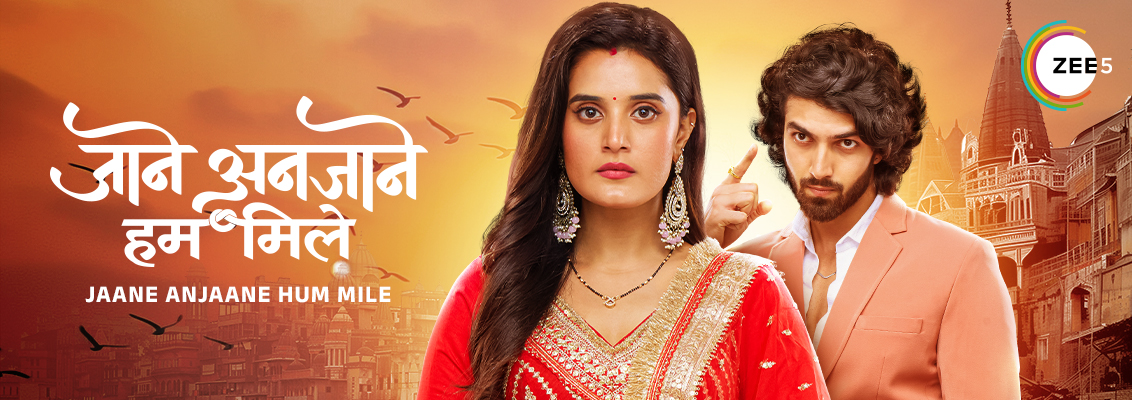Previously, on two people who keep circling the same truth
They’ve fought the pull with rules, timing, and the occasional bad decision. But when a bond insists on being seen, the world starts rearranging furniture to make space. This week, Tumm Se Tumm Tak stopped flirting with fate and let it speak in full sentences.
The auspicious collision: a temple, a sign, a vanishing act
Call it luck, call it destiny, call it an overbooked calendar from the gods—Anu and Arya land at the same temple, miles of doubt collapsing into one courtyard. For Anu, it’s the proof she needed: I’m not imagining this; we’re meant to be here—together. For Arya, it’s terror disguised as restraint. He hides himself in the crowd, watching her scan faces with that stubborn hope he’s both drawn to and afraid of. The scene plays like a parable: the bell rings; devotion is easy. Surrender is the hard part.
When Anu realizes he was there and still chose not to meet her, something breaks—but not the way you’d think. Pride doesn’t explode; it crystallizes. She decides to leave for Jaipur, not as retreat but as a line: If you won’t stand next to me, I won’t stand still.
The sprint against resolve
Resolutions are tidy on paper; in the chest, they’re chaos. Arya’s composure lasts exactly until the platform clock stares back. Feelings beat resolve by a mile. He rushes to stop Anu, and it’s messy in the right ways: hurried calls, a near-missed cab, the soundscape of a station breathing in departures and exhaling regret. No grand speech—just urgency. It’s enough.
Stranded together: the small hotel that shrinks the distance
Travel gremlins—of course. A late-night schedule change, a canceled connection, rain that refuses to be background. Anu and Arya end up in a small hotel, two rooms reduced to one availability, the universe with its mischievous grin. The show handles it with a careful hand: boundaries, awkward politeness, two people negotiating space like it’s a fragile heirloom. We get the tiny domestic beats—one towel folded just so, Anu perching on the edge of the bed with her phone face-down, Arya pretending sleep will obey orders.
Midnight truth: a confession meant for silence
He gives up first. In the half-dark, with the hum of a ceiling fan and the city thinning to whispers, Arya confesses his love—soft, unguarded, believing Anu is asleep. The words aren’t rehearsed; they trip, they land, they are true. He thanks her for the temple, for the stubbornness, for the ache that turned out to be map and compass. He apologizes for running. He doesn’t know she’s awake, breath held, eyes wet. She hears everything.
That’s the magic of the scene: it’s intimate without spectacle. The story trusts quiet. So does love.
Morning after: eyes where they shouldn’t be
Daylight has a way of demanding invoices. As Anu and Arya step out of the hotel—a heartbeat lighter, a future still unspoken—Meera and Jhende spot them together. It’s less a discovery than a detonation. All the conversations they owe the world (and each other) suddenly have witnesses. Gossip gets legs; enemies get leverage; even well-meaning friends get confused.
High Point of the Week
“Through divine intervention, Anu and Arya reach the same temple proving Anu right about their relationship, but Arya hides himself from Anu. Anu realises Arya hid himself and decides to leave for Jaipur. Arya realizes his feelings are stronger than his resolve and rushes to stop Anu from leaving. Anu Arya are forced to live in a small hotel. Arya confesses his love for Anu assuming she is asleep, but she has heard it all. The next day as Anu and Arya are leaving the hotel, Meera and Jhende spot them together.”
Why it lands: the show stacks spiritual certainty, human hesitation, accidental proximity, and public exposure into one clean arc. Fate opens the door; fear closes it; love reopens it; society barges in.
Character tracker — who moved the needle
-
Anu: Finds confirmation in the temple, then dignity in leaving. She doesn’t gloat when she hears the confession; she stores it like a promise she’ll let him repeat in daylight.
-
Arya: The man who hides becomes the man who runs—toward her. The confession is growth you can hear: no metaphors, no hedges, just yes.
-
Meera & Jhende: More than bystanders. They are catalysts with cameras for eyes. Whether they act out of concern or calculation will shape next week’s fire.
Themes that throb under the dialogue
-
Faith vs. fear: Signs are useless if you won’t step into them. The temple sequence says “together”; Arya hears it only after almost losing the chance.
-
Private truth, public cost: Confessions are easy at 2 a.m. The morning requires receipts.
-
Rooms as tests: The cramped hotel isn’t scandal; it’s a pressure cooker that distills what’s essential—tenderness, boundaries, admission.
Scene of the week — the not-quite-asleep confession
Direction keeps the camera close without crowding. Arya’s voice is the score; the fan’s whirr is percussion. Anu’s stillness becomes grammar—every near-flinch a comma, the tear that doesn’t fall a full stop. The restraint makes it cinematic. When he whispers her name like it’s both question and answer, the scene earns its place in the season’s highlight reel.
Lines we carried out of the episode
-
Anu (at the temple, to herself): “If you’re here, say it. If you’re not, I’ll go.”
-
Arya (in the dark): “I tried to be wise. It felt a lot like being cowardly.”
-
Meera (whispering to Jhende, morning street): “Do we ask… or do we warn?”
(Indicative paraphrases to capture the emotional beats.)
What this sets up (and why it’s deliciously tense)
-
A conversation owed in daylight: Anu knows he loves her; he doesn’t know she knows. Expect a scene where she refuses to let the confession stay “off the record.”
-
Social blowback: Meera and Jhende’s sighting can morph into rumors by lunch. Families, employers, and that one uncle with the loud WhatsApp group will have Opinions™.
-
Arya’s courage test: He can’t hide behind fate anymore. Does he formalize what he said at night… when faces are watching?
Prediction board (grain of salt, full heart)
-
Meera confronts before Jhende broadcasts. She’ll want the story directly from Anu—friend first, witness second.
-
A heartfelt reprise: Arya will repeat the confession, this time eyes-to-eyes, and it will land not as surprise but as ceremony.
-
An unintended ally: The hotel manager—or a temple priest—will vouch for propriety, blunting the nastiest gossip just enough to keep bridges unburned.
Final word
This week, fate did the introduction and fear tried to end the meeting. Love, annoyingly persistent, insisted on a second round. The temple proved the point, the hotel distilled it, and the street turned it into a headline. Now comes the real test: not whether Anu and Arya feel the same (we know), but whether they can hold that truth when the world insists on reading it out loud.
Bio of Author: Gayatri Tiwari is an experienced digital strategist and entertainment writer, bringing 20+ years of content expertise to one of India’s largest OTT platforms. She blends industry insight with a passion for cinema to deliver engaging, trustworthy perspectives on movies, TV shows and web series.




